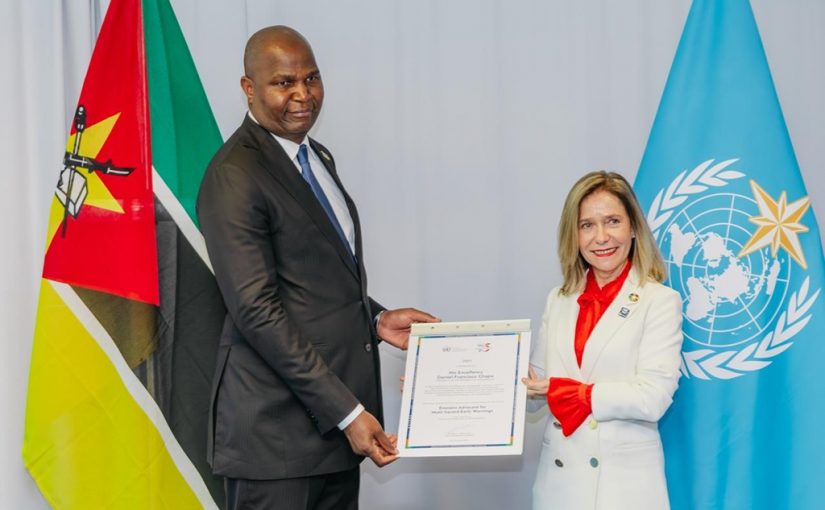Mozambique: Ex-Renamo fighters announce management committee to call party congress and elect new ...
Mozambique president honoured as advocate for early warning systems

Photo: Presidency of the Republic of Mozambique
The President of Mozambique, Daniel Chapo, was on Monday recognised in Geneva, Switzerland, by the World Meteorological Organization (WMO) as an “Eminent Advocate of Multi-Hazard Early Warning Systems”.
President Chapo received the distinction after speaking as the keynote speaker on the high-level panel on the “Early Warnings for All Initiative and the Role of NMHSs (National Meteorological and Hydrological Services)”, at the invitation of the organisation’s Secretary-General, Andrea Celeste Saulo.
She added that the recognition signifies that Mozambique has leadership whose actions are appreciated worldwide.
“We wanted to acknowledge the president for this important approach for the continent, [and] also for Mozambique,” said Saulo, who noted that the WMO can facilitate Mozambique’s access to international funding mechanisms, allowing the country to expand its meteorological and hydrological observation networks.
“We are doing everything possible to ensure that countries in the region have greater capacity to meet the needs of their people,” Saulo stated.
She also revealed that Mozambique benefits from around US$9 million through the SOFF mechanism (Systematic Observations Financing Facility), intended to strengthen the national meteorological observation network.
In his address to the WMO extraordinary congress in Switzerland, President Chapo stated that Mozambique is installing weather radars that will integrate into the WMO’s Global Basic Observation Network (GBON), to enhance the country’s ability to forecast and monitor extreme weather events in real time, with support from the SOFF mechanism.
“Mozambique is also intensifying its efforts to incorporate digitalisation and artificial intelligence into the modernisation of early warning systems and processes,” he added.
Nonetheless, the Mozambican president acknowledged the country’s limitations in financing climate-resilient models, calling for strengthened mobilisation of new partnerships to create a mechanism that is “innovative and accessible”.
“Climate financing in Mozambique is still limited; our state budget, with the inherent constraints of a developing country, is insufficient to fund a growth model resilient to global climate change,” Chapo admitted.
To address this, the head of state advocated the mobilisation of new public and private partnerships, “innovative and accessible financing mechanisms, and the reaffirmation of a shared need” among nations and multilateral institutions to tackle climate change events, which cyclically affect the African country.
Mozambique is considered one of the most vulnerable countries, severely affected by climate change, regularly facing floods and tropical cyclones during the rainy season, which runs annually from October to April.
Between December and March of the last cyclone season alone, Mozambique was hit by three cyclones, including Chido, the first and most severe, at the end of 2024. The number of cyclones affecting the country “has increased over the past decade,” along with wind intensity, according to the 2024 Mozambique Climate State report by the National Institute of Meteorology, published in March.
Extreme weather events caused at least 1,016 deaths in Mozambique between 2019 and 2023, affecting around 4.9 million people, according to previous data from the National Statistics Institute.












Leave a Reply
Be the First to Comment!
You must be logged in to post a comment.
You must be logged in to post a comment.